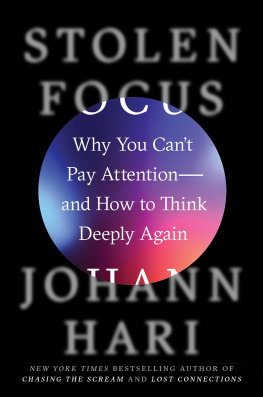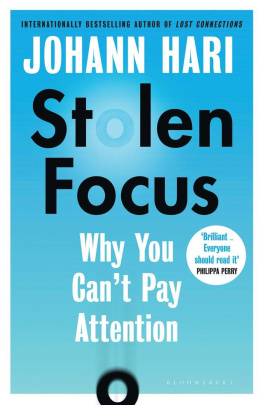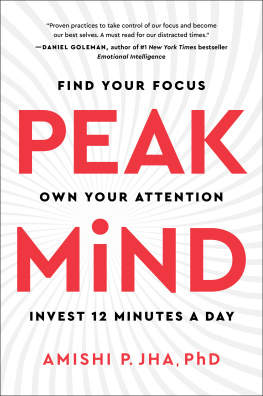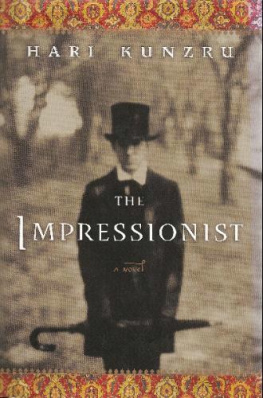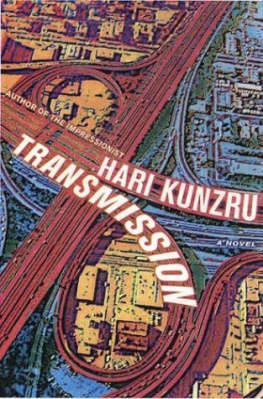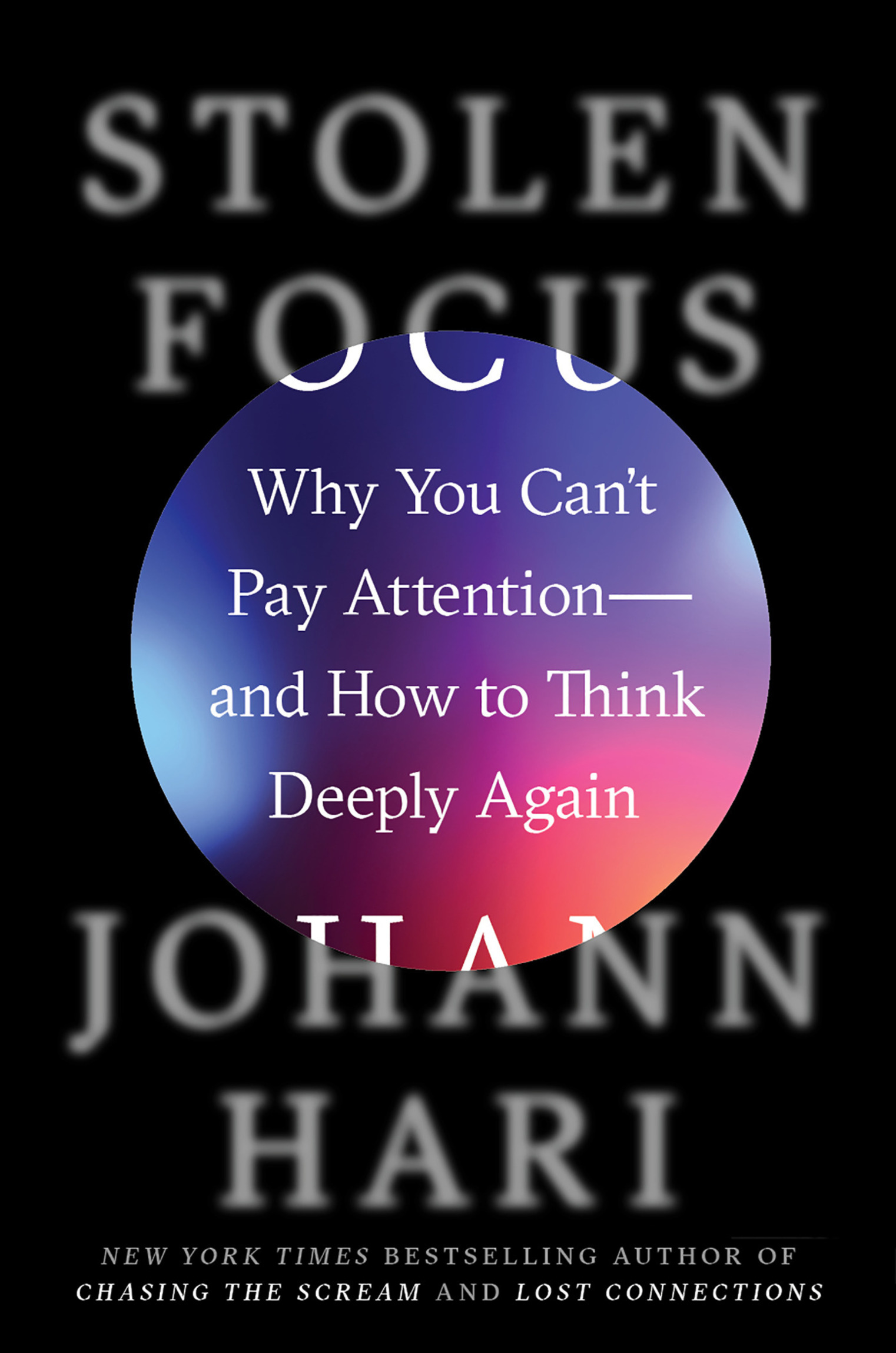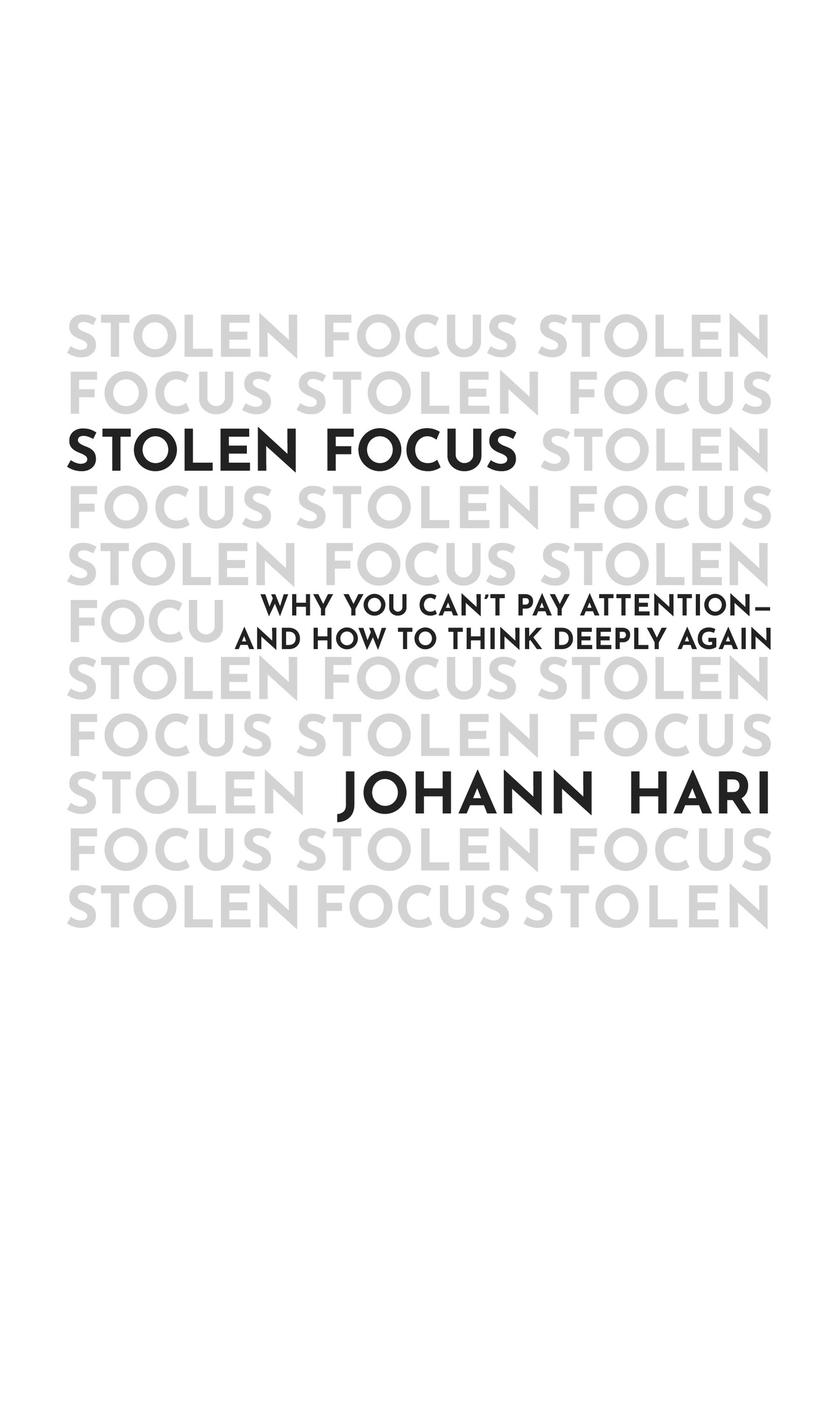All rights reserved.
Originally published in hardcover in Great Britain by Bloomsbury Publishing Plc, London, in 2022.
Crown and the Crown colophon are registered trademarks of Penguin Random House LLC.
Names: Hari, Johann, author.
Title: Stolen focus / Johann Hari.
Description: First edition. | New York: Crown, 2021 | Includes bibliographical references and index.
Identifiers: LCCN 2021040207 (print) | LCCN 2021040208 (ebook) | ISBN 9780593138519 (hardcover) | ISBN 9780593138526 (ebook)
Subjects: LCSH: Attention. | Distraction (Psychology)
Classification: LCC BF321 .H287 2021 (print) | LCC BF321 (ebook) | DDC 153.7/33dc23
I have posted audio clips of all the people I quote in this book on its website, so as you read this book, you can listen along to our conversations. Go to stolenfocusbook.com/audio.
INTRODUCTION
Walking in Memphis
When he was nine years old, my godson developed a brief but freakishly intense obsession with Elvis Presley. He took to singing Jailhouse Rock at the top of his voice, with all the low crooning and pelvis-jiggling of the King himself. He didnt know this style had become a joke, so he offered it with all the heart-catching sincerity of a preteen who believes he is being cool. In the brief pauses before he started singing it all over again, he demanded to know everything (Everything! Everything!) about Elvis, and so I jabbered out the rough outline of that inspiring, sad, stupid story.
Elvis was born in one of the poorest towns in Mississippia place far, far away, I said. He arrived in the world alongside his twin brother, who died a few minutes later. As he grew up, his mother told him that if he sang to the moon every night, his brother could hear his voice, so he sang and sang. He began to perform in public just as television was taking offso in a sudden swoosh, he became more famous than anyone had ever been before. Everywhere Elvis went, people would scream, until his world became a chamber of screams. He retreated into a cocoon of his own construction, where he gloried in his possessions in place of his lost freedom. For his mother he bought a palace and named it Graceland.
I skimmed through the restthe descent into addiction, the sweating, girning stage-jammering in Vegas, the death at the age of forty-two. Whenever my godson, who Ill call AdamIve changed some details here to avoid identifying himasked questions about how the story ended, I got him to duet Blue Moon with me instead. You saw me standing alone, he sang in his little voice, without a dream in my heart. Without a love of my own.
One day, Adam looked at me very earnestly and asked: Johann, will you take me to Graceland one day? Without really thinking, I agreed. Do you promise? Do you really promise? I said I did. And I never gave it another thought, until everything had gone wrong.

Ten years later, Adam was lost. He had dropped out of school when he was fifteen, and he spent literally almost all his waking hours at home alternating blankly between screenshis phone, an infinite scroll of WhatsApp and Facebook messages, and his iPad, on which he watched a blur of YouTube and porn. At moments, I could still see in him traces of the joyful little boy who sang Viva Las Vegas, but it was like that person had broken into smaller, disconnected fragments. He struggled to stay with a topic of conversation for more than a few minutes without jerking back to a screen or abruptly switching to another topic. He seemed to be whirring at the speed of Snapchat, somewhere where nothing still or serious could reach him. He was intelligent, decent, kindbut it was like nothing could gain any traction in his mind.
During the decade in which Adam had become a man, this fracturing seemed to be happeningto some degreeto many of us. The sensation of being alive in the early twenty-first century consisted of the sense that our ability to pay attentionto focuswas cracking and breaking. I could feel it happen to meI would buy piles of books, and I would glimpse them guiltily from the corner of my eye as I sent, I told myself, just one more tweet. I still read a lot, but with each year that passed, it felt more and more like running up a down escalator. I had just turned forty, and wherever my generation gathered, we would lament our lost capacity for concentration, as if it was a friend who had vanished one day at sea and never been seen since.
Then one evening, as we lay on a large sofa, each staring at our own ceaselessly shrieking screens, I looked at Adam and felt a low dread. We cant live like this, I said to myself.
Adam, I said softly. Lets go to Graceland.
What?
I reminded him of the promise I had made to him so many years before. He couldnt even remember those Blue Moon days, nor my pledge to him, but I could see that the idea of breaking this numbing routine ignited something in him. He looked up at me and asked if I was serious. I am, I said, but theres one condition. Ill pay for us to go four thousand miles. Well go to Memphis, and New Orleanswell go all over the South, anywhere you want. But I cant do it if, when we get there, all youre going to do is stare at your phone. You have to promise to leave it switched off except at night. We have to return to reality. We have to reconnect with something that matters to us. He swore he would, and a few weeks later, we lifted off from London Heathrow, toward the land of the Delta blues.

When you arrive at the gates of Graceland, there is no longer a human being whose job is to show you around. You are handed an iPad, and you put in little earbuds, and the iPad tells you what to doturn left; turn right; walk forward. In each room, the iPad, in the voice of some forgotten actor, tells you about the room you are in, and a photograph of it appears on the screen. So we walked around Graceland alone, staring at the iPad. We were surrounded by Canadians and Koreans and a whole United Nations of blank-faced people, looking down, seeing nothing around them. Nobody was looking for long at anything but their screens. I watched them as we walked, feeling more and more tense. Occasionally somebody would look away from the iPad and I felt a flicker of hope, and I would try to make eye contact with them, to shrug, to say, Hey, were the only ones looking around, were the ones who traveled thousands of miles and decided to actually see the things in front of usbut every time this happened, I realized they had broken contact with the iPad only to take out their phones and snap a selfie.

